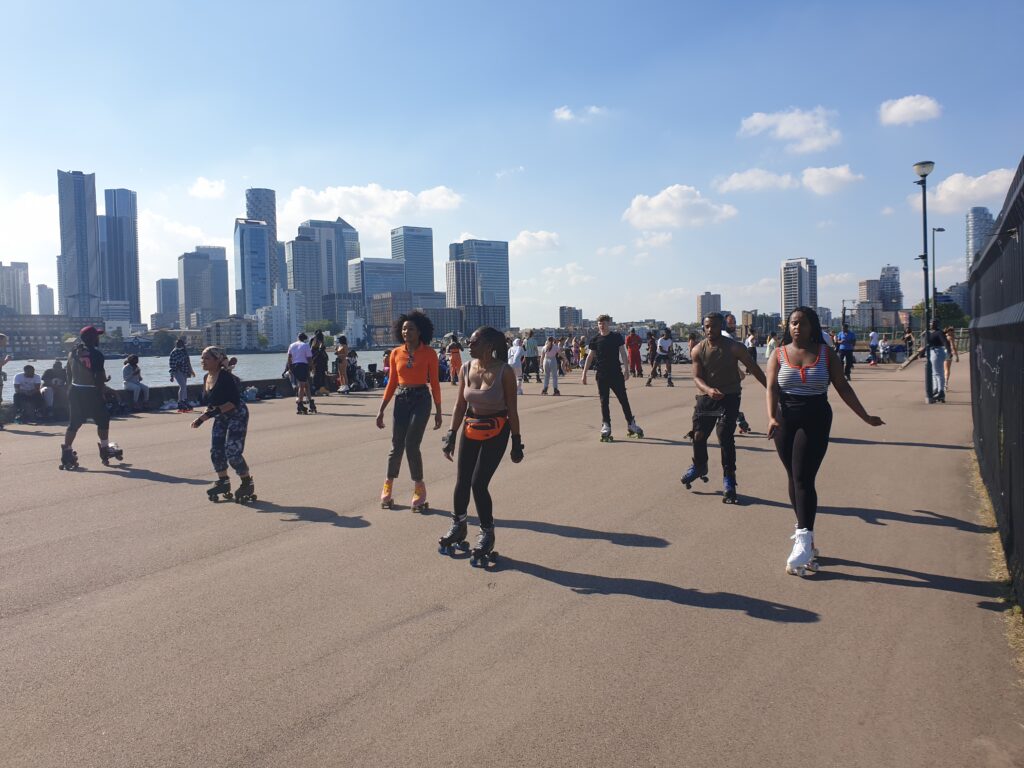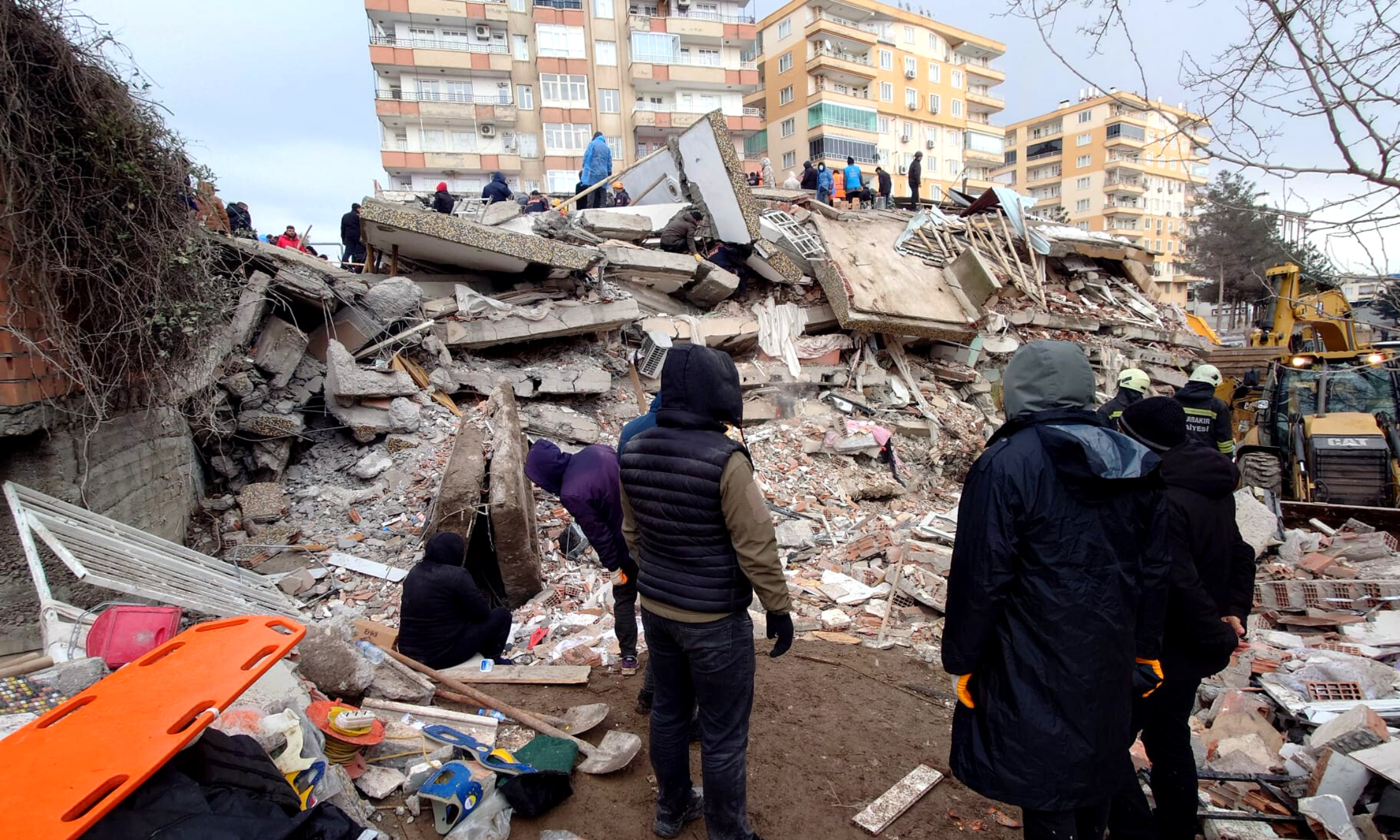How rollerskating’s Black-led resurgence is saving a generation
Skating groups are popping up across the UK, creating community and joy for those most marginalised.
Olivia Davies
12 Jun 2021

Photography by Olivia Davies
Videos of carefree roller skaters began to dominate social media feeds over the last year. In the first lockdown, after dismissing it as something I was too old for, I caved to the social pressure and downloaded TikTok. Soon my feed was filled with bite-sized videos of skaters who looked like me effortlessly flowing, swaying and sashaying with little regard for the downward pull of gravity. Their joy was infectious – roller skating looked like fun I didn’t know I was allowed to have as an adult.
During lockdown, outdoor exercise became one of the few reasons we were allowed to leave the four walls of our homes. It’s no wonder that skating has gained so much popularity in the past year – searches for ‘roller skating’ and ‘roller skates’ surged in May 2020.
Lacing up my first pair of skates, I was catapulted back to a former version of myself. After months of stagnation and isolation, I found motivation, community and a reason to go outside – the perfect antidote to the lockdown blues.
“Part of Black lives mattering is our minds mattering too, being able to go out and having some fun, enjoying life”
Sheila Samuels
Now, on an uncharacteristically sunny day, arriving at one of my first skate events feels like a homecoming. Led by the bassy rumble of competing sound systems, I found the spot that allured skaters from London and beyond. On a secluded strip nestled between a manicured golf range and the murky River Thames, experienced speed skaters and cautious beginners alike came together to experience a day of unconditional support, knowledge exchange and unbridled bliss. In the centre, surrounded by the steady flow of clockwise movement was a pocket of jam skaters practising impressive-looking choreography. This is where I met Rue-Ann.
Like many new skaters, Rue-Ann Paisley, a 24-year-old production manager, fell for the sport at the beginning of the first lockdown. Although she bought her first pair of skates almost six years prior, due to her commitments to athletics, she was never able to throw herself into skating. But when lockdown arrived and she was put on furlough, Rue-Ann decided to spend her extra time improving her skating skills. “I had my skates and thought, you know what? Let’s just go to the local park and actually try and see what I can do with it.” It has since become her anchor during these challenging times and has had a profound effect on her mental wellbeing.
Skating is a form of meditation for Rue-Ann. “When you’re in your zone with your headphones on, you focus on the movement and not necessarily what’s on your mind or what’s going on around you”, she tells me in an almost dream-like state. “I wouldn’t say I have the best self-esteem,” she admits. “But skating has definitely made me more confident. Putting time and effort into something that you love doing boosts you up a lot. It’s a sense of liberation.”
This feeling of liberation is a universal sentiment echoed in all the skaters I’ve encountered. Sheila Samuels, a new skater in her 50s, has also been reaping the rewards after a month on roller skates. The last time she was on skates was over 40 years ago, but after hearing about a local group and seeing the fun they were having, she knew she wanted in. “With skating, you can just forget about the stressors of life. You can just go out, put your skates on and feel free,” she explains with a wide smile.
As a therapist, Sheila is intimately aware of the need for an outlet, especially in the year we’ve just had. “Part of Black lives mattering is our minds mattering too, being able to go out and having some fun, enjoying life. Yes, there is the seriousness of life, but to cope with that you need to be mentally capable of doing that.”
Given the demographics that algorithm-based platforms tend to favour, you could be forgiven for thinking that Black people hopped onto the scene just this year. However, there’s a rich history of Black skaters both here in the UK and across the pond. In the US, roller skating is deeply rooted in African American communities and there are long-established skating communities in parts of the UK too.
“Once you’re within the skating community, you become family”
Rue-Ann Paisley
During the Civil Rights Movement, roller rinks set the stage for the first sit-in protests, yet to this day, traces of Jim Crow-era segregation can be seen in the euphemistic language of ‘adult’ or ‘urban nights’ and arbitrary rules banning the use of small wheels which enable Black skaters to perform their signature tricks. This link between Black social movements and skating is a thread that has continued into the recent resurgence of the Black Lives Matter movement, with stateside skate rallies being held in support. In London, Rue-Ann and a group of fellow skaters also attended a protest in skates. “We’re targeted just for having wheels on our feet, and then we’re also Black people. I think it’s just important to go out there and support in any way that you can.”
Between the weight of police brutality, a femicide epidemic, and a global pandemic, the past few years have been heavy for Black people, and people from marginalised genders. It was that unrelenting trauma that fueled Naomi Minto, 35, to create Sisterhood on Wheels, a safe space for Black women to support each other as they learn to skate and share in their unabashed delight.
“As women, we tend to be at the forefront of movements and protests but we don’t tend to focus any of that energy on making sure that we’re okay. We need to take care of our own wellbeing”. When Naomi initially put out the idea for a skating group she didn’t expect much, but in a few short months the Birmingham-based group has quickly gained almost 800 members.
Naomi, who is a poet who also goes by Nia Speaks, is incredibly passionate about the community she’s building. Just speaking about it over our Zoom call gets her emotional: “I just feel so happy and proud to have had a role in bringing all these people together”. In this particular time in history, Sisterhood on Wheels has become a sacred sanctuary of self-care and self-expression. “A lot of us feel like we have to kind of temper ourselves down in everyday life, in every environment that we’re in. But when we’re together as a sisterhood there’s a power in the fact that we can be as loud as we want to be together as a group. We’re all together, just having fun together. If we want to be loud, we’re loud. It’s the freedom to just be who you are.”
“When we’re together as a sisterhood there’s a power in the fact that we can be as loud as we want”
Naomi Minto
The power of skating can’t be underestimated and the unwavering support of strangers can be transformative. “Sometimes there’s a fear of starting something because what if you fail. But what if you don’t fail? Or what if you do fail, then that’s a valuable lesson because you’ll learn how to pick yourself back up?” Naomi ponders. “The community aspect of skating is so important because there’s always support,” Sheila tells me. “It doesn’t matter if you know each other or not”. Rue-Ann agrees: “Once you’re within the skating community, you become family.”
And the family is growing. As Rue-Ann tells me, the size of the community has bloomed over the past year and the visibility of the sport has brought new and exciting opportunities. She has even showcased her skills in music videos for MoStack and AJ Tracey. I ask her if she’s worried that the budget for skaters will dry up once marketers hop onto the next big thing, and her answer gives me hope. “Those opportunities might go, which I highly doubt, but we’re staying, because this is what we love to do. Once you’ve fallen in love with skating, there’s no going back.”






